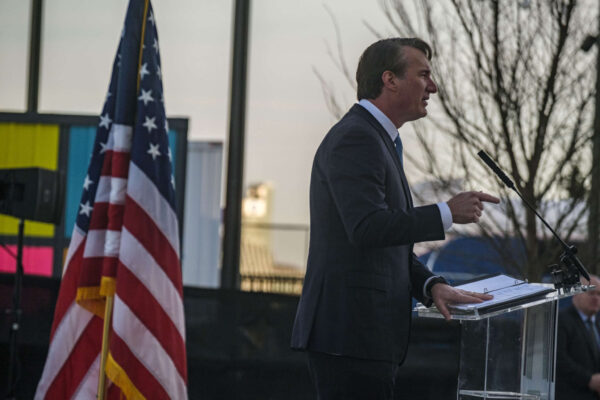
Gov. Glenn Youngkin and many Northern Virginia officials disagree over whether a repeal in the 2.5% grocery sales tax will adversely affect transit or not.
The governor has made eliminating the tax a priority, but proponents and opponents are painting vastly different portraits of how a repeal could affect transportation funding.
“We are at a time where we can eliminate the grocery tax and increase funding for infrastructure,” Youngkin said, adding that “there’s plenty of money in the system” and Virginia has “transportation dollars at the ready.”
At a groundbreaking ceremony in Tysons today (Monday) for the I-495 Express Lanes extension, the Republican governor described the multiyear project as the kind of private-public partnership that can help save taxpayers’ money.
Like its other express lane projects in the area, the Virginia Department of Transportation partnered with the private toll lanes operator Transurban on 495 NEXT. The company will design, build, and operate the new lanes.
The grocery sales tax supports school districts, transportation and local governments, but the Virginia General Assembly adjourned its 60-day regular session over the weekend without making a decision on conflicting budget bills.
A bill by Sen. Jennifer Boysko, who represents parts of Fairfax and Loudoun counties in the 33rd District, calls for continuing educational funding from the state if the bill became law. A proposal from Del. Joseph McNamara (R-Roanoke) would eliminate grocery taxes but dedicate a certain amount of sales and use tax revenue to localities for schools.
Fairfax County Board of Supervisors Chairman Jeffrey McKay told FFXnow today that he disagrees with the governor.
The board sent a letter on Feb. 22 to the county’s General Assembly delegation expressing concern at the idea of eliminating grocery taxes without finding other revenue to fund transportation needs.
According to the letter, the sales tax brings $135 million annually to the state’s Commonwealth Transportation Fund, as well as an additional $60 million to $70 million to Fairfax County each year. The transportation fund goes toward highway maintenance and operations, such as repaving, snow removal and mowing, construction programs, and public transportation.
“While the recently passed federal infrastructure package, the Infrastructure Investment and Jobs Act (IIJA), is expected to bring significant resources to the Commonwealth, that legislation only reauthorizes federal transportation programs through (fiscal year) 2026,” the letter said, noting concerns over one-time funds.
McKay contrasted one-time federal funds with annual, predictable contributions to transportation through the sales tax.
“We can’t leave one penny on the table,” McKay told attendees at the 495 NEXT groundbreaking. “Nowhere do I go in Northern Virginia do people, ‘We can afford to lose a single dollar for transportation.’ They say we need every single dollar possible and available going into improving the lives of people in Northern Virginia.”

